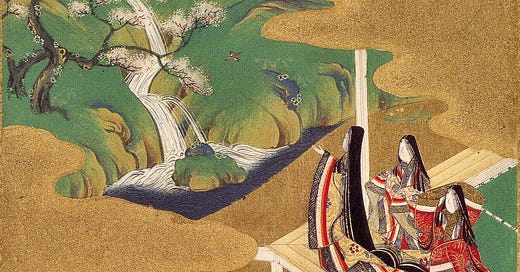One look at the picture—and you’ve got the idea. Our man Genji is doing what he does best—just like in chapter three, he is out in the countryside with his sidekick (and servant) Koremitsu recovering from yet another illness— but instead of resting, he is roaming around looking for ladies. In the picture, we see him peeping between the gaps of a fence, drooling over a new lady-love.
As I mentioned in an earlier Genji post, during the Heian period, aristocratic women lived “veiled.” Custom demanded they remain hidden at home behind bamboo blinds (misu 御簾) and standing curtains (kichō 几帳). These women rarely ventured out. Not unlike how women are veiled in Saudi Arabia, a hint of an ankle could be very exciting. A rustle behind the curtains. A whiff of perfume. You get the idea.
The problem is this time Genji is stalking a ten-year-old girl.You must come to my house. I have all sorts of pictures, and there are dolls for you to play with.
This is still early days in the Tale —and yet by chapter five, we have already witnessed Genji abducting a woman, resulting in her death. And a young boy too. He has also cuckolded his father, the emperor—something he repeats with Fujitsubo again in chapter five, this time resulting in a pregnancy.Reading a novel that is a thousand years old, we know we cannot judge the people of the distant past by the standards of today per se—and yet, how can we stomach the way Genji is basically “grooming” a small child? He wants to adopt her, he says. And then, wants to shape her into his future wife.
How can modern readers stomach this?Right now, I am reading a fantastic novel called The Devoted, by Blair Hurley— about a religious convert to “Zen” Buddhism. The story takes place in Boston and I put scare quotes around Zen because the “Zen” of the “master” in the novel is actually a mishmash of Tibetan, Zen, and Pure Land Buddhism. The master is a huckster— and has built a semi-successful Zendo teaching his own version of Buddhism to American believers—one of whom is a young woman of eighteen; a person he seduces and then controls.
The story is reminiscent of memoirist Natalie Goldberg’s sad story of her own disillusionment with her Zen master, Katagiri Roshi. To find out that he was sleeping with his female students for years after her devoted following of his moral teachings hit her hard, and it is something she returns to again and again in her books.
Maybe not unlike how some people feel about the Dalai Lama this week. Disillusioned and grossed out. Again and again, the same old story.
In the novel by Hurley, the sexual relationship is only the tip of the iceberg as the emotional control is really what drives the story. And this is all happening in Boston against the scandals of the Catholic church.
Yes, Children.So, back to the Tale of Genji. The little girl whom Genji is stalking is named Murasaki. Murasaki, it turns out, is the niece of Genji’s father’s favorite consort, the future empress Fujitsubo (whom Genji loves desperately and impregnates later in the chapter). The physical resemblance between Fujitsubo and Murasaki explains Genji’s intense attraction to the child. Murasaki 紫 means purple, or lavender, so even her name evokes his desperate longing for his father’s beloved consort Fujitsubo (fuji means wisteria 藤, the purple flower).
In the picture at the top, Genji is watching as the child Murasaki is crying because her pet bird has flown off. Her caregivers are reminding her that in Buddhism releasing a bird from captivity is a Karmic merit—and therefore it is beneficial that the pet bird escaped. In Thailand, even today, you can pay a few dollars to have merchants “release birds” for karmic merit. Of course, the merchants captured the birds to make money and so the system is not very compassionate in the first place.
Genji watches the scene and makes his move.
He wants to adopt the child. He tells her grandmother, it is karma. His attachment to her cannot be denied and he wants to protect her. Everyone tells him it is inappropriate, but eventually Genji gets what he wants—and Murasaki is installed in his quarters. Her education then begins.
The question I ask myself is how, despite Genji’s numerous transgressions, he is not judged by the narrator to be a rogue— but rather, he completely preserves his pristine charisma. What is going on in the mind of the author?
In the essay “Ritual, Moral Personhood, and Spirit Possession in The Tale of Genji,” by James McMullen from Murasaki Shikibu's The Tale of Genji: Philosophical Perspectives (James McMullen (ed.)), McMullen explains the moral universe of the Genji by invoking a wonderful book on Confucianism by Herbert Fingarette called, Confucius: The Secular As Sacred.
I am a huge fan of the book. Like the Rare Art Traditions by Joseph Alsop, Fingarette wrote an incredibly exciting and original work about something that is strictly not part of his area of expertise.
The Secular as Sacred asks the question: How can we read Confucius without tainting our reading with modern concepts of psychology and the self? In this case, how can we understand Genji’s behavior beyond the modern nexus of moral choices and moral responsibility? Of Christian heaven and hell. Of philosophical natural laws. How to not filter our reading of person-making vis-a-vis our moral choices.
And more questions: How can Genji retain the moral high ground in this novel as the hero, when he seems more worried about people finding out about his transgressions than in repenting them—and how can the translators navigate this without using terms such as sin and remorse, when the text does not seem to actually point in that direction?
It is clear that at this early point in the story (chapter five), Genji does not feel guilt over his transgressions against natural laws or moral codes; but rather, he is worried that he will be caught and made to feel shame at having brought disharmony (embarrassment to his father). He doesn’t want people to think badly about him. And he definitely doesn’t want his father to find out he is sleeping with Fujitsubo, who in our terms is like a step-mother.
McMullen suggests that different from our own law-based moral order, Genji’s world could better be characterized as being an “aesthetic order.” Person-building happens vis-a-vis rituals and inter-personal relationships —and therefore, Genji’s worries are more about being seen or found out —and thereby shamed.
McMullen writes:
Reflecting these serious offenses, the Genji adopts special vocabulary for the mindset among participants in secretive high-status adultery. They suffer from kokoro no oni (心の鬼; literally, a “demon of the heart”). This locution is defined by the great philologist Motoori Norinaga (1730–1800) as referring to “a person who has erred unknown to others, being frightened in their own minds.” He links it to a Song Dynasty Chinese commentary on the Daoist classic Liehzi, where it seems to refer to delusional mental agitation: “When there are doubts, the doubting mind produces all sorts of delusions.”
The problem for the modern reader is not why Genji does what he does— since to our mind, he is quite simply a morally corrupt person. Selfish and entitled. And in chapter five, we read him as being a pedophile. Our problem as readers is not regarding Genji but rather to how to understand why the author remains sympathetic to him.
++
** McMullen, drawing on Fingarette explains ritual in the following way and suggests that it is something held in common in the aristocratic courts of Europe in the Middle Ages and the Renaissance—this constant worry of “what people think.”Fingarette’s analysis of Confucius’s construction of the human self privileges “ritual” (Chinese li 禮; Japanese rei 礼) as the key to person formation, and its mastery as the primary existential charge on individuals. Human normative behavior is sited externally in the performance of ritual rather than, as in later Confucian thinking, the realization of an inborn propensity or adherence to an abstract or transcendental structure of values or law. “Ritual” covers religious and cultural ceremonies and, more broadly, the etiquette and norms informing relationships of persons within organized society. At its broadest, ritual “works through spontaneous coordination [of all forms of social intercourse] rooted in reverent dignity.” Its perfection “is esthetic as well as spiritual,” and beauty of person and deportment are important aspects of its practice.1 Personhood is acquired, shaped, and controlled by ritual. It must be learned, but is also personal and particular, for “beautiful and effective [rite]
Discussion about this post
No posts






I've struggled with this issue. I even have an essay I wrote when I was reading the chapter on Utsusemi, and I didn't publish it because I didn't like thinking about it. And yet I love Genji and always have. I wonder if reading Genji is meant to be a little bit like watching Succession (i.e. filled with loathsome characters doing awful things). In other words, we're supposed to be gazing at the story, not aligning ourselves with anyone in it? I'm assuming that the readers who got their hands on it back when Murasaki (the author) was writing it were familiar with court life. Perhaps they waited eagerly for each installment, wondering if Genji was going to be caught, and wondering about the fate of Murasaki (the child). It's interesting to think about whose point of view we are hearing in Genji, and whether the original Japanese feels courtly and distant, versus intimate and personal.
I'm still trying to figure out what I love so much about the Tale of Genji!
I consider myself quite well read on japan, nonetheless I learned a lot reading this, cool! 🤩
I wonder if you have read the novel about Jiraiya the gallant? I cant find a translated version anywhere? Have you maybe covered that already?
Katakiuchi Kidan Jiraiya Monogatari (報仇奇談自来也説話, "The Tale of the Gallant Jiraiya")